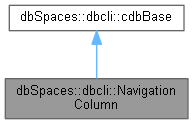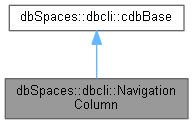#include <Ccdb_NavigationColumn.h>


Public Member Functions | |
| ~NavigationColumn () | |
| const dtRtnStatus | BindColumn (dtSTRING *value, const dtULARGE length, dtTINY *indicator=NULL) |
| const dtRtnStatus | BindColumn (dtUSTRING *value, const dtULARGE length, dtTINY *indicator=NULL) |
| template<class T > | |
| dtRtnStatus | BindColumn (T *value, dtTINY *indicator=NULL) |
| const dtULARGE | GetDefinitionNumber () |
| const dtSTRING * | GetDescription () |
| const dtSTRING * | GetFormat () |
| dtTINY * | GetIndicatorAddress (const dtULARGE=0) |
| const dtSTRING * | GetName () |
| const dtLARGE | GetNativeStorageClass () |
| const dtULARGE | GetNativeStorageSize () |
| const dtSTRING * | GetNativeTypeName () |
| const dtULARGE | GetNumberMultiValues () |
| const dtULARGE | GetOffset () |
| const dtULARGE | GetOrdinalPosition () |
| const dtULARGE | GetPrecision () |
| const dtULARGE | GetScale () |
| const dtUTINY | GetStorageClass () |
| const dtULARGE | GetStorageSize () |
| const dtRtnStatus | GetValue (void *, dtTINY *=NULL) |
| void * | GetValueAddress (const dtULARGE=0) |
| const dtBOOLEAN | IsDecimalImplied () |
| const dtBOOLEAN | IsNullable () |
| const dtBOOLEAN | IsRedefine () |
| const dtBOOLEAN | IsSigned () |
| const dtRtnStatus | SetValue (dtSTRING *values, dtULARGE length, dtTINY *indicators=NULL) |
| const dtRtnStatus | SetValue (dtUSTRING *values, dtULARGE length, dtTINY *indicators=NULL) |
| const dtRtnStatus | SetValue (void *values, dtTINY *indicators=NULL) |
| template<class T > | |
| dtRtnStatus | SetValue (T &values, dtTINY *indicators=NULL) |
 Public Member Functions inherited from dbSpaces::dbcli::cdbBase Public Member Functions inherited from dbSpaces::dbcli::cdbBase | |
| cdbBase (cdbBase *, ccdbClassType, dtBOOLEAN=TRUE) | |
| virtual | ~cdbBase () |
| cdb_childList_t & | GetChildList () |
| Ccoms_CommsManager * | GetTransportComms () |
| ccdbClassType | GetType () |
| void | SetTransportComms (Ccoms_CommsManager *) |
NavigationColumn object. The NavigationColumn represents the column information for each column in a table.
A DatabaseException will be thrown if a database error occurs and exceptions are enabled. If exceptions are not enabled the following error methods can be used to get information about the error;
| dbSpaces::dbcli::NavigationColumn::~NavigationColumn | ( | ) |
NavigationColumn destructor.
|
inline |
Bind a program variable to the column. Bound columns have their variables populated with data when rows are fetched from the database.
If the column is a multi-value (array) then the value and indicator variables should be large enough to contain all multi-values.
For example, if the storage class is a dtLARGE (size of 4 bytes) and the column has 2 multi-values, then value will be 8 bytes in size. The first 4 bytes contains the first value and the second 4 bytes contains the second value. Similarly for indicator its size will be 2 bytes, the first byte contains the indicator value for the first value and the second byte contains the indicator value for the second value.
| value | Value(s) address. |
| length | The length in bytes of the value. |
| indicator | Indicator(s) address used to indicate NOT NULL or NULL data. Possible indicator values are;
|
|
inline |
This is an overloaded member function, provided for convenience. It differs from the above function only in what argument(s) it accepts.
|
inline |
Bind a program variable to the column. Bound columns have their variables populated with data when rows are fetched from the database.
If the column is a multi-value (array) then the value and indicator variables should be large enough to contain all multi-values.
For example, if the storage class is a dtLARGE (size of 4 bytes) and the column has 2 multi-values, then value will be 8 bytes in size. The first 4 bytes contains the first value and the second 4 bytes contains the second value. Similarly for indicator its size will be 2 bytes, the first byte contains the indicator value for the first value and the second byte contains the indicator value for the second value.
| value | Value(s) address. |
| indicator | Indicator(s) address used to indicate NOT NULL or NULL data. Possible indicator values are;
|
| const dtULARGE dbSpaces::dbcli::NavigationColumn::GetDefinitionNumber | ( | ) |
A table can have multiple column definitions which represent multiple record (or row) layouts. COBOL is an example of a data source that have multiple record layouts (definitions).
| const dtSTRING * dbSpaces::dbcli::NavigationColumn::GetDescription | ( | ) |
Get the column description.
| const dtSTRING * dbSpaces::dbcli::NavigationColumn::GetFormat | ( | ) |
Get the data type display format for the column.
| dtTINY * dbSpaces::dbcli::NavigationColumn::GetIndicatorAddress | ( | const | dtULARGE = 0 | ) |
Get the column indicator address. If the column is a multi-value column (array) the index starts from from ZERO (defaults to ZERO).
| index | The multi-value index. |
| const dtSTRING * dbSpaces::dbcli::NavigationColumn::GetName | ( | ) |
Get the column name.
| const dtLARGE dbSpaces::dbcli::NavigationColumn::GetNativeStorageClass | ( | ) |
Get the native data source storage class for the column.
| const dtULARGE dbSpaces::dbcli::NavigationColumn::GetNativeStorageSize | ( | ) |
Get the native data source storage size for the column.
| const dtSTRING * dbSpaces::dbcli::NavigationColumn::GetNativeTypeName | ( | ) |
Get the native data source type name for the column.
| const dtULARGE dbSpaces::dbcli::NavigationColumn::GetNumberMultiValues | ( | ) |
Get the number of multi-values for the column. Arrays are treated as a column of multi-values.
| const dtULARGE dbSpaces::dbcli::NavigationColumn::GetOffset | ( | ) |
Get the column offset in the table row buffer.
| const dtULARGE dbSpaces::dbcli::NavigationColumn::GetOrdinalPosition | ( | ) |
Get the column ordinal position in the table.
| const dtULARGE dbSpaces::dbcli::NavigationColumn::GetPrecision | ( | ) |
Get the colum precision. Precision is the number of digits in a number.
| const dtULARGE dbSpaces::dbcli::NavigationColumn::GetScale | ( | ) |
Get the column scale. Scale is the number of digits to the right of the decimal point in a number.
| const dtUTINY dbSpaces::dbcli::NavigationColumn::GetStorageClass | ( | ) |
Get the storage class ID for the column.
| const dtULARGE dbSpaces::dbcli::NavigationColumn::GetStorageSize | ( | ) |
Get the storage size (bytes) for the column.
| const dtRtnStatus dbSpaces::dbcli::NavigationColumn::GetValue | ( | void * | , |
| dtTINY * | = NULL |
||
| ) |
Get the column's value and return it in the buffer provided.
If the column is a multi-value (array) then the value and indicator variables should be large enough to contain all multi-values.
For example, if the storage class is a dtLARGE (size of 4 bytes) and the column has 2 multi-values, then value will be 8 bytes in size. The first 4 bytes contains the first value and the second 4 bytes contains the second value. Similarly for indicator its size will be 2 bytes, the first byte contains the indicator value for the first value and the second byte contains the indicator value for the second value.
| value | Value(s) address. |
| size | The size in bytes of the value. |
| indicator | Indicator(s) address used to indicate NOT NULL or NULL data. Possible indicator values are;
|
| void * dbSpaces::dbcli::NavigationColumn::GetValueAddress | ( | const | dtULARGE = 0 | ) |
Get the column's address in the table row buffer. If the column is a multi-value column (arrary) the index starts from from ZERO (defaults to ZERO).
| index | The multi-value index. |
| const dtBOOLEAN dbSpaces::dbcli::NavigationColumn::IsDecimalImplied | ( | ) |
Check if the column decimal point is implied. If the decimal point is implied use Scale to determine the decimal point position.
TRUE if decimal is implied; FALSE if otherwise. | const dtBOOLEAN dbSpaces::dbcli::NavigationColumn::IsNullable | ( | ) |
Is the column is nullable?
TRUE if nullable; FALSE if otherwise. | const dtBOOLEAN dbSpaces::dbcli::NavigationColumn::IsRedefine | ( | ) |
Does this column redefine another column?
TRUE if a column redefine; FALSE if otherwise. | const dtBOOLEAN dbSpaces::dbcli::NavigationColumn::IsSigned | ( | ) |
Is the column data type signed?
TRUE if signed; FALSE if otherwise.
|
inline |
Set the column's value with the value provided.
If the column is a multi-value (array) then the value and indicator variables should be large enough to contain all multi-values.
For example, if the storage class is a dtLARGE (size of 4 bytes) and the column has 2 multi-values, then value will be 8 bytes in size. The first 4 bytes contains the first value and the second 4 bytes contains the second value. Similarly for indicator its size will be 2 bytes, the first byte contains the indicator value for the first value and the second byte contains the indicator value for the second value.
| value | Value(s) address. |
| length | The length in bytes of the value. |
| indicator | Indicator(s) address used to indicate NOT NULL or NULL data. Possible indicator values are;
|
|
inline |
This is an overloaded member function, provided for convenience. It differs from the above function only in what argument(s) it accepts.
|
inline |
This is an overloaded member function, provided for convenience. It differs from the above function only in what argument(s) it accepts.
|
inline |
Set the column's value with the value provided.
If the column is a multi-value (array) then the value and indicator variables should be large enough to contain all multi-values.
For example, if the storage class is a dtLARGE (size of 4 bytes) and the column has 2 multi-values, then value will be 8 bytes in size. The first 4 bytes contains the first value and the second 4 bytes contains the second value. Similarly for indicator its size will be 2 bytes, the first byte contains the indicator value for the first value and the second byte contains the indicator value for the second value.
| value | Value(s) address. |
| indicator | Indicator(s) address used to indicate NOT NULL or NULL data. Possible indicator values are;
|